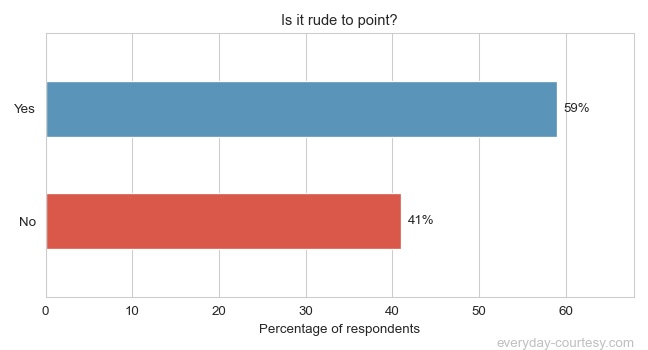Many parents in the United States and other countries teach their children not to point. From as soon as they’re old enough to understand, children in many households learn that pointing at strangers, classmates or even members of their own family is rude.

Many people will readily agree that pointing with a finger is rude. It’s also rude to point with the lips, elbows, or other parts of the body. This article will explain why it’s rude to point.
Is It Rude to Point?
We asked 103 U.S. residents if it was rude to point at someone. 59% of respondents said it was rude, while 41% said it was not rude to point at someone.

This survey refers to conscious pointing and it doesn’t take into account the unconscious pointing that we do with our feet or other parts of our body when we are interested in someone. Human beings have a tendency to direct their feet towards the person who interests them and this type of unconscious pointing is not thought of as rude. It’s an honest display of emotions and is not intended to be aggressive.
Try to Avoid Pointing in Any Way
Sometimes people try to be discreet with their pointing. For example, instead of pointing with their finger, they may use a pen in their hand to indicate the person that they’re talking about.
Some may also quickly purse their lips in the direction of the person who they’re speaking about. Even though this may be more difficult to pick up on than when someone points with a finger, if an individual notices it, it will still make them feel uncomfortable.
How Does Pointing Make Another Person Feel?
When you point at someone, it makes them feel uncomfortable. They’re made aware that you’re likely to be discussing them and they’re not sure whether the topic of conversation is positive or negative.
The courtesies that we’ve developed in society are meant to put people at ease. Whenever an action or activity upsets this balance, it’s typically a good idea to avoid it.
If someone feels threatened by an individual who is pointing at them or they feel themselves becoming angry, they may warn the person by saying:
“Kindly avoid pointing your finger at me.”
“Stop pointing your finger in my face.”
“I would prefer that you don’t point to me.”
Wagging a Finger
When some individuals are speaking to someone, they tend to wag their fingers up and down. This gives the impression that they are correcting someone and it can make the other person feel annoyed.
It’s best to avoid wagging your finger at anyone, especially if you are discussing a problem. Use hand gestures that are less likely to make the other person feel as if they are being corrected.
You want to arrive at a consensus and to do that, you’ll need to facilitate open discussion. [1]
You generally want each individual to feel as if they’re contributing to finding or implementing a solution, not someone who is being lectured on their behavior. Wagging your finger doesn’t have that effect. It can come across as rude and it sometimes makes another person feel as though they have nothing good to contribute.
Perceived as Aggressive
If you’re talking directly to someone and you start to point at them, it can be seen as an act of aggression. People react almost instinctively to someone pointing at them while they’re speaking to them and the reaction is usually not positive. The closer someone comes to you while they’re pointing at you, is the more likely you are to feel agitated, irritated, or annoyed.
In some situations, people point at others when they’re accusing them of something.
For example, if a lawyer is making an argument in a courtroom, they may point at the accused. If someone is accusing another person of lying, they may also frequently find themselves pointing at the person as they do so.
Pointing can escalate tension when you’re speaking to someone. For example, if you are discussing a team member’s failure to deliver reports on time, it’s wise to avoid body language that’s perceived as aggressive or accusing. If you start pointing to them while reminding them of all the times that they’ve missed deadlines for reports, they are less likely to listen to what you’re saying.
Similarly, if you’re a parent who is correcting your child, pointing to them while speaking about their behavior in an aggressive tone can have the opposite effect of what you want. They’ll become defensive instead of focusing on solutions that can help them to improve their behavior. Discuss the changes that you would like to develop while focusing on how you can use existing strengths to improve character. Don’t point, shout or scream at them. [2]
Superstition
In times past, pointing was avoided because some people saw it as a sign of a hex. If you pointed at someone, they thought that you were trying to put a curse on them. This practice still exists in many countries. [3]
If they had a menacing facial expression, it wouldn’t have helped much either in that case. If the person who was being pointed at coincidentally fell ill shortly thereafter, anyone who had been unfortunate enough to point at them before that would have been blamed for the calamity that followed.
How Can You Avoid Pointing?
Some people point because they think it’s more efficient. However, even when you’re pointing at a person, the individual you’re talking to has to follow your line of vision accurately and it can take them some time to figure out who you’re talking about.
Simply describe the person by giving details on their height or what they’re wearing.
For example, if a customer comes up to you and asks for the sales manager, you could simply describe them as the lady on their left who is wearing a red blazer.
Sources:
[2]: https://kidshealth.org/en/parents/nine-steps.html
[3]: https://www.nbcnews.com/news/wbna4795886

Matt Vargas is an author and public speaking coach with a degree in sociology and more than ten years of practical experience. Matt is responsible for the empirical surveys at everyday-courtesy.com, is a passionate recreational musician, and blogs here about his experiences in the field of interpersonal communication.

